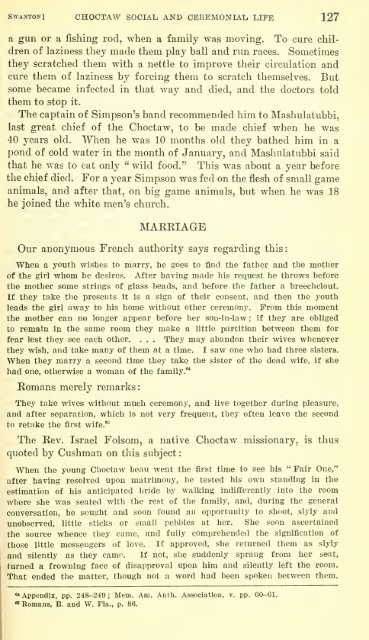siOBX; - Smithsonian Institution
siOBX; - Smithsonian Institution
siOBX; - Smithsonian Institution
Create successful ePaper yourself
Turn your PDF publications into a flip-book with our unique Google optimized e-Paper software.
SWANTON] CHOCTAW SOCIAL AND CEREMOISTIAL, LIFE 127<br />
a gun or a fishing rod, when a family was moving. To cure children<br />
of laziness they made them play ball and run races. Sometimes<br />
they scratched them with a nettle to improve their circulation and<br />
cure them of laziness by forcing them to scratch themselves. But<br />
some became infected in that way and died, and the doctors told<br />
them to stop it.<br />
The captain of Simpson's band recommended him to Mashulatubbi,<br />
last great chief of the Choctaw, to be made chief when he was<br />
40 years old, Wlien he was 10 months old they bathed him in a<br />
pond of cold water in the month of January, and Mashulatubbi said<br />
that he was to eat only " wild food." This was about a year before<br />
the chief died. For a year Simpson was fed on the flesh of small game<br />
animals, and after that, on big game animals, but when he was 18<br />
he joined the white men's church.<br />
MARRIAGE<br />
Our anonymous French authority says regarding this:<br />
Wheu a youth wishes to marry, he goes to find the father and the mother<br />
of the girl whom he desires. After having made his request he throws before<br />
the mother some strings of glass beads, and before the father a breechclout.<br />
If they take the presents it is a sign of their consent, and then the youth<br />
leads the girl away to his home without other ceremony. From this moment<br />
the mother can no longer appear before her son-in-law ; if they are obliged<br />
to remain in the same room they make a little partition between them for<br />
fear lest they see each other. . . . They may abandon their wives whenever<br />
they wish, and take many of them at a time. I saw one who had three sisters.<br />
When they marry a second time they take the sister of the dead wife, if she<br />
had one, otherwise a woman of the family.**<br />
Romans merely remarks:<br />
They take wives without much ceremony, and live together during pleasure,<br />
and after separation, which is not very frequent, they often leave the second<br />
to retake the first wife.*"<br />
The Rev. Israel Folsom, a native Choctaw missionary, is thus<br />
quoted by Cushman on this subject<br />
When the young Choctaw beau went the first time to see his " Fair One,"<br />
after having resolved upon matrimony, he tested his own standing in the<br />
estimation of his anticipated bride by walking indifferently into the room<br />
where she was seated with the rest of the family, and, during the general<br />
conversation, he sought and soon found an opportunity to shoot, slyly and<br />
unobserved, little sticks or small pebbles at her. She soon ascertained<br />
the source whence they came, and fully comprehended the signification of<br />
those little messengers of love. If approved, she returned them as slyly<br />
and silently as they came. If not, she suddenly sprang from her seat,<br />
turned a frowning face of disapproval upon him and silently left the room.<br />
That ended the matter, though not a word had been spoken between them.<br />
" Appendix, pp. 248-249 ; Mem. Am. Anth. Association, v. pp. 60-61.<br />
« Romans, B. and W. Fla., p. 86.

















